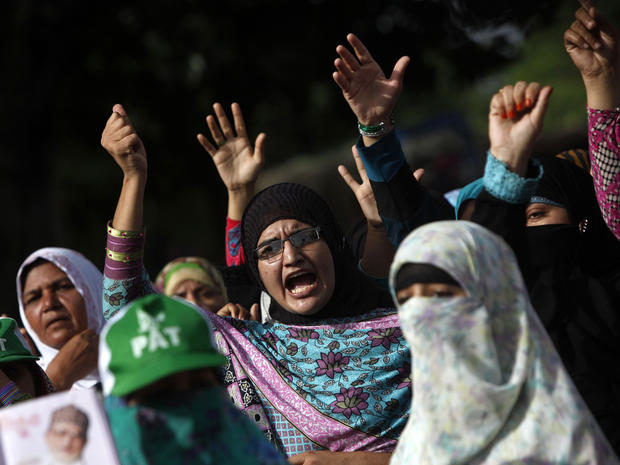Large protests may trigger crackdown in Pakistan
ISLAMABAD -- Pakistan's cricket-star-turned-politician Imran Khan suspended negotiations with Prime Minister Nawaz Sharif's government Thursday amid signs of the country's rulers preparing for a possible crackdown on protesters.
"I have suspended the talks with the government," Khan told some of his supporters after reports of the appointment of a new police chief in the capital city of Islamabad, which could be a precursor to a crackdown.
Earlier, politicians representing Khan and Tahir-ul-Qadri, a moderate Islamic scholar, who are both seeking to remove Sharif, were locked in tense negotiations to end a weeklong deadlock unleashed by mounting protests that have paralyzed parts of Islamabad.
For the past week, Khan, the legendary former cricket star, and Qadri have together led thousands of protesters to the streets of the nuclear-armed country's capital. Khan claims that Sharif's victory in last summer's elections became possible through widespread electoral fraud while Qadri is pushing for sweeping political reforms that will end the hold of wealthy landowners and businessmen on the country's politics.
The protests have triggered widespread anxieties over an eventual intervention by Pakistan's army, which has ruled the country for almost half of its 67 years of existence as an independent state.
Such an eventuality will present a difficult policy dilemma for the U.S., which has built close military ties with Pakistan since the Sept. 11 terrorist attacks as Washington battled Taliban militants and al Qaeda across the Pakistan-Afghanistan region.
Up to $3 billion in annual U.S. civil and military assistance to Pakistan could be thrown in jeopardy if there is a military coup in Pakistan, western diplomats warned.
"It is imperative for these negotiations to succeed so that the deadlock ends," said one senior western diplomat, who spoke to CBS News on the condition that he would not be named. "Otherwise, a military takeover will be a challenge for all of us.
The diplomat added: "By end 2014, there is a coming drawdown [of U.S.-led western troops] from Afghanistan. We need a relatively stable Pakistan, which will help with that [coming] drawdown. You can't sanction Pakistan [after a coup] and then expect this country to generously cooperate [with the U.S.-led western alliance]."
Separately, a senior Pakistani foreign ministry official, who also spoke to CBS News on the condition that he would not be named, revealed that the U.S. and other western countries had discretely sent messages to both Sharif and his opponents, urging them to settle their dispute amicably.
"No one from the outside world wants conditions in Pakistan to spin out of control," the official said. "They [U.S. and other western countries] have all urged our leadership to find a way to end this crisis."
In recent days, Khan has said repeatedly that he will not back away without Sharif's resignation in a message that has emulated public comments by Qadri.
"Pakistan cannot be reformed as long as there aren't meaningful changes in our country; Sharif must go for Pakistan's destiny to improve," Khan said in a speech this week, which was cheered by thousands of spectators.
Since early Wednesday, thousands of supporters of Khan and Qadri have gathered across the road from Pakistan's parliamentary building, located inside an area known as the "Red Zone," which is home to high-profile government buildings and the city's diplomatic quarters, including the U.S. Embassy.
Both Khan and Qadri have carefully kept the protesters at a safe distance from the area where the embassies are located - a zone now protected by the Pakistani army.
On Thursday, a Pakistani government minister, who spoke to CBS News on the condition that he would not be named, said, "There is some hope of an eventual resolution to the crisis, which will allow this situation to be resolved."
Though the final shape of a settlement remained unclear, the minister said, discussions behind the scenes had considered demands by Khan and Qadri for major electoral reform to prevent a repeat of the shortcomings in the 2013 elections.
But he said that Sharif was unwilling to relent on the demand by Khan and Qadri for his resignation, adding, "The prime minister believes he has the mandate to rule Pakistan till 2018 and that mandate must be respected."
But among Khan's supporters there were clear signs of increasing restlessness among ordinary Pakistanis over the worsening quality of daily life that may have prompted many to join the demonstrations.
This summer has witnessed parts of Pakistan remain without electricity for up to 20 hours a day, mainly because of the failure of the government's electricity company to improve efficiency levels and the failure over time to increase the supply of electricity to keep up with the demand from a growing population.
"The prime minister lives in a mansion where the lights never go out," said Saba Khan, a young woman who works at a bank in Islamabad. "We live in misery, and the lights go out all the time. We need a more caring government, and Imran Khan, I believe, will provide that."
Saeed Khawaja, a lawyer who traveled to Islamabad from the central city of Lahore to join the protest, said: "The protest proves Pakistanis are angry with the government. We have been pushed to this point [to protest] because nobody [in the government] was willing to look at the lives of ordinary people who live in misery every day. Now, it may be too late for our rulers."
